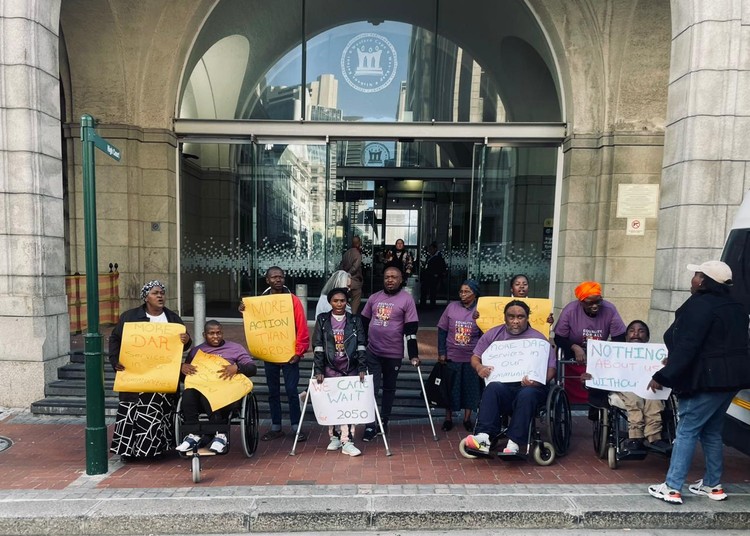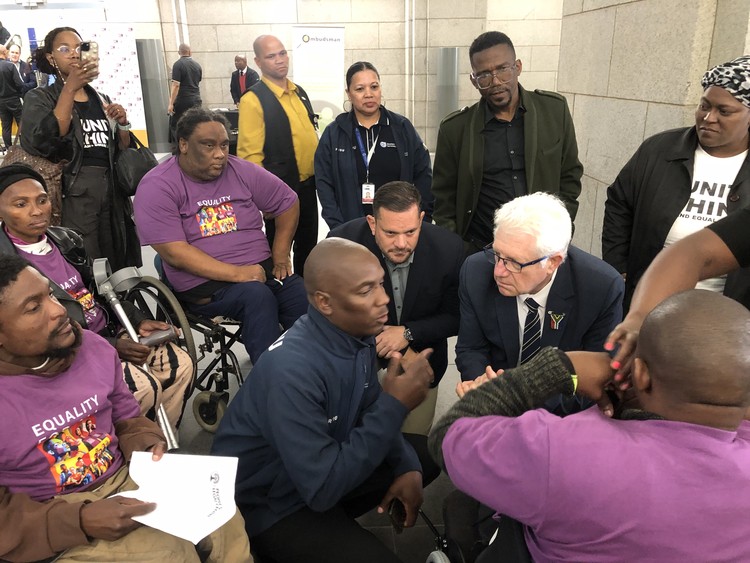Dial-a-Ride users struggle with bookings
Cape High Court ordered City of Cape Town to pause plans to cut back on transport service for disabled people
Disability activists picketed outside this month’s Open Government First Thursday event to highlight their fight for the Dial-a-Ride service. Photo: Stephen Lakey
- Some Dial-a-Ride users say they’ve been struggling to book trips with the service in recent weeks.
- This is despite a court ruling ordering the City of Cape Town to pause its plans to cut back on its service.
- The Western Cape Network on Disability has until this Friday to file a court application to review the municipality’s decision to cut the service.
Some Dial-a-Ride users say they’ve struggled to book trips despite a court ruling ordering the City of Cape Town to pause its plan to cut back on the service, mostly used by disabled people.
In August the municipality announced that the service would only be available for people who use wheelchairs or have severe walking impairments. People with visual and cognitive impairments, elderly people, and organisations using the service to transport people with disabilities would no longer be accommodated.
This sparked outrage among disability rights organisations who wrote an open letter to the municipality, started a petition, and launched a BackaBuddy fundraising campaign to stop the planned cuts.
The Western Cape Network on Disability also launched an urgent application at the Western Cape High Court for an interim interdict to stop the cuts for 60 days. The City filed a notice of intention to oppose the application but met the network’s representatives and reached an agreement which was made an order of the court.
According to the court order, the City must “reverse any reduction” in the service that has already been implemented. The Western Cape Network on Disability has until Friday, 10 October to file a court application to review the municipality’s decision to cut the service.
But regular Dial-a-Ride users say they faced many challenges with the booking system.
Disability activists voiced their frustrations at this month’s Open Government First Thursday event at the provincial legislature in the city centre. The event offers the opportunity for one-on-one talks with the Premier, MECs and departmental staff.
Wheelchair user Kholiswa Yeki from Khayelitsha told GroundUp she has been a client of Dial-a-Ride since 2003. She said problems with the service started for her in 2020, when the bus came late or did not arrive at all.
“I am no longer working now but have been using the service to go to my hospital appointments or pick up my medication. Since last week, I have been struggling to get a booking. Each time I phone, I’m told that the service is fully booked,” she said.
“What is frustrating is that the service does not allow me to book in advance. I have to book on the day. One could previously book seven days in advance. By 10am buses are already fully booked. I was supposed to collect my medication last Thursday, but I have not been able to and I do not have money for transport,” said Yeki.
The activists got a opportunity to speak directly to Premier Alan Winde and mayco member for urban mobility Rob Quintas. Photo: Mary-Anne Gontsana
Luwie Links, from Kraaifontein, uses the service to and from work in Salt River during the week. He also used it to run errands and go to church.
“My pick-up time is supposed to be 5:20am. But I get picked up any time from 6am. And there is no consultation or communication with me. It is only when I call that I am told that my time has been changed by the bus driver,” said Links.
Premier Alan Winde listened to the group’s complaints and promised to investigate.
Rob Quintas, mayco member for urban mobility, who was also present, said there had been no reduction in the service. He said the City was adhering to the court order, but there had been challenges with the booking system with the contractor. However, these issues had been resolved, he said.
“We kindly request users to please report incidents or complaints to the Transport Information Centre so that the City can investigate these and take action or intervene as needed.”
“Dial-a-Ride is not public transport. The revenue sources for it cannot match the demand,” said Quintas.
Winde said the provincial social development department had put some smaller vehicles in place.
Support independent journalism
Donate using Payfast

Don't miss out on the latest news
We respect your privacy, and promise we won't spam you.
Next: Factory workers to march as Lesotho’s textile jobs hang by a thread
Previous: Workers take to the streets on World Day for Decent Work
© 2025 GroundUp. This article is licensed under a Creative Commons Attribution-NoDerivatives 4.0 International License.
You may republish this article, so long as you credit the authors and GroundUp, and do not change the text. Please include a link back to the original article.
We put an invisible pixel in the article so that we can count traffic to republishers. All analytics tools are solely on our servers. We do not give our logs to any third party. Logs are deleted after two weeks. We do not use any IP address identifying information except to count regional traffic. We are solely interested in counting hits, not tracking users. If you republish, please do not delete the invisible pixel.


